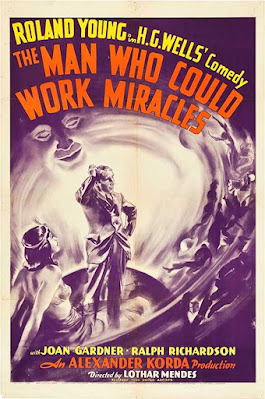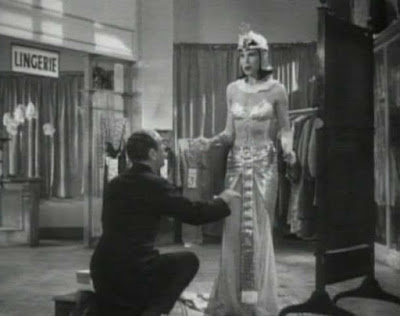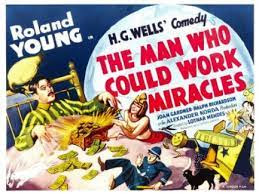
Director:
Lothar Mendes
Year: 1936
Rating: 6.0
Year: 1936
Rating: 6.0
An English production from the Korda brothers and London Film, but the important
piece of this is that it is based on a short story by H.G. Wells and within
its comedic clothing is an attack on capitalism, utopianism and totalitarianism.
Wells was an avowed Socialist and he saw the dangers of all these especially
in the mid-30's. They are not particularly sharp attacks - more pinning caricatures
to the wall. Easy doing really. Big fat targets and readily mockable.

Three Gods hover over earth and argue the value of man. Are they a failed experiment, do they need more time or do they need more power. One of them says more power and I will prove it by giving one individual the power to do anything. The person he chooses at random is Mr. Fotheringay - a clerk in a clothing store. A little man physically but also of ambition, of imagination, of heart. In other words a man like most of us. Played by Roland Young of Topper fame - perfect for this role of a mumbling uncertain man who has no idea what to do with these powers.

He could have anything and initially asks only for grapes and to help with his work. He decides to ask a few people what to do with these powers - businessmen who tell him profit, profit, profit - greed is good. A clergyman who tells him cure the ill and give everything to people that they need. A few flaws there as well. And finally to a Colonel who tells him to change nothing. Nothing at all. Society is structured just right. For you perhaps, says Fotheringay. Not for small men like me. I was born small and I will remain small. And he turns to fascism of course looking at this point no longer the little man but remarkably like Hitler as he rages and threatens the establishment of politicians, military and business owners.

The Colonel is hammed up by Ralph Richardson, Ernest Thesiger is the reverend and in small roles there are three actors who would become much better known later on - George Sanders as one of the Gods, George Zucco as a butler and Joan Hickson (Miss Marple) as one of the clerks in the store. With Young you can count on underplayed British comedy and there are moments of good humor - some funny lines - but at 80 minutes it almost goes by too quickly and none of these ideas are fleshed out - just skewered in passing. In the end the God who gave him powers stays hopeful and says if we come back in another age they will have gained the wisdom to go with great power. How is that going so far?


Three Gods hover over earth and argue the value of man. Are they a failed experiment, do they need more time or do they need more power. One of them says more power and I will prove it by giving one individual the power to do anything. The person he chooses at random is Mr. Fotheringay - a clerk in a clothing store. A little man physically but also of ambition, of imagination, of heart. In other words a man like most of us. Played by Roland Young of Topper fame - perfect for this role of a mumbling uncertain man who has no idea what to do with these powers.

He could have anything and initially asks only for grapes and to help with his work. He decides to ask a few people what to do with these powers - businessmen who tell him profit, profit, profit - greed is good. A clergyman who tells him cure the ill and give everything to people that they need. A few flaws there as well. And finally to a Colonel who tells him to change nothing. Nothing at all. Society is structured just right. For you perhaps, says Fotheringay. Not for small men like me. I was born small and I will remain small. And he turns to fascism of course looking at this point no longer the little man but remarkably like Hitler as he rages and threatens the establishment of politicians, military and business owners.

The Colonel is hammed up by Ralph Richardson, Ernest Thesiger is the reverend and in small roles there are three actors who would become much better known later on - George Sanders as one of the Gods, George Zucco as a butler and Joan Hickson (Miss Marple) as one of the clerks in the store. With Young you can count on underplayed British comedy and there are moments of good humor - some funny lines - but at 80 minutes it almost goes by too quickly and none of these ideas are fleshed out - just skewered in passing. In the end the God who gave him powers stays hopeful and says if we come back in another age they will have gained the wisdom to go with great power. How is that going so far?
